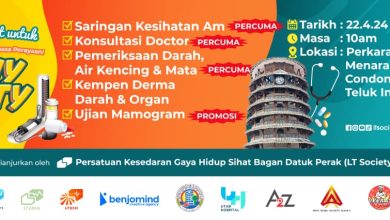By SeeFoon Chan-Koppen
In the last issue IE265, Ipoh Echo spoke to Dr. Lee Boon Chye, Consultant Cardiologist at KPJ Ipoh Specialist Hospital on the topic of heart attack and today we move onto another aspect of the heart : the valves, their repair or replacement.


As the only full time Cardiothoracic Surgeon in Ipoh, Dr. Ko received his medical degree from Dublin University graduating in 1992 and worked in many hospitals in the UK receiving his specialist qualification in Cardiothoracic surgery in 2001. Three years in the General Hospital in Penang then saw him moving into private practice at KPJ Ipoh in 2004 where he has been ever since. In that time, Dr. Ko has performed nearly 2,000 heart operations including bypass and valves as well as approximately 1,000 lung operations. Which makes him a true expert to talk about heart valve repair and replacement.
“The symptoms for heart valve problems may include shortness of breath, the sensation of breathlessness in the recumbent position almost like drowning (called orthopnoea); palpitations; swelling of the ankles; dizziness with occasional fainting spells called a syncopal attack and in severe cases, a stroke as a complication,” Dr. Ko iterated.
“Anyone with such symptoms should see their cardiologist for an ECG, chest X-ray and an Echocardiogram which is an ultrasound of the heart showing the valves moving. Both the left and right valve can be damaged for various reasons like in degeneration from aging where the valves are calcified, weakened, thinned or loose. Of course younger people can also have problems with their heart valves although this is less common,” he added.


“Heart valves can either be repaired or replaced depending on the damage. If the valve is very stiff or calcified, then a replacement is necessary. This can be a mechanical artificial valve made from titanium and carbon or a biological one either bovine (from cows) or porcine (from pigs). The decision on which valve to use depends on the age of the patient with the biological one being safer (again can be replaced) but does not last as long as the mechanical one which come with its own set of drawbacks including getting jammed, infected, or with blood clotting around it. And patients with a mechanical valve will have to take Warfarin (a blood thinner) for life,” Dr. Ko continued.
Dr. Ko assesses the risk/benefit ratio with patients very carefully before recommending the right valve for each individual. For patients older than 70 years, he recommends replacing with the biological valve, while for those younger than 60, the mechanical one.
Every patient who has had a valve replacement must go for a routine check every three months and for those on Warfarin, a blood test. Warfarin users are also warned to avoid pain killers and some other medications as these may interfere with the warfarin or potentiate other medications. So, working with your doctor after valve surgery is critical. Another note of caution from Dr. Ko is to be very cautious about dental procedures as the bacteria from the mouth and gum can travel to the heart. It is therefore imperative to maintain strict dental hygiene always.
Although the idea of a heart valve operation may be fearful, Dr. Ko assures patients that 98-99% of all elective heart surgeries are successful. He cites the case of a recent 84 year old patient who had an aortic valve replacement and who is now hale and hearty and enjoying a full life.
“I get my satisfaction from seeing patients who after 10 or more years after surgery, are living full and active lives. That is fulfilment for my work”, he enthused.
Dr. Ko Chung Sen Suite 2-01, KPJ Ipoh Specialist Hospital. 28, Jalan Raja Dihilir, 30350 Ipoh. Tel: 05-2408777, 05-2537835

